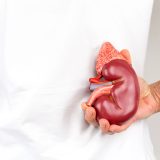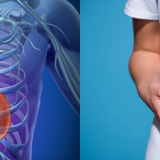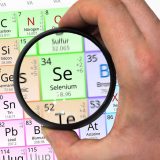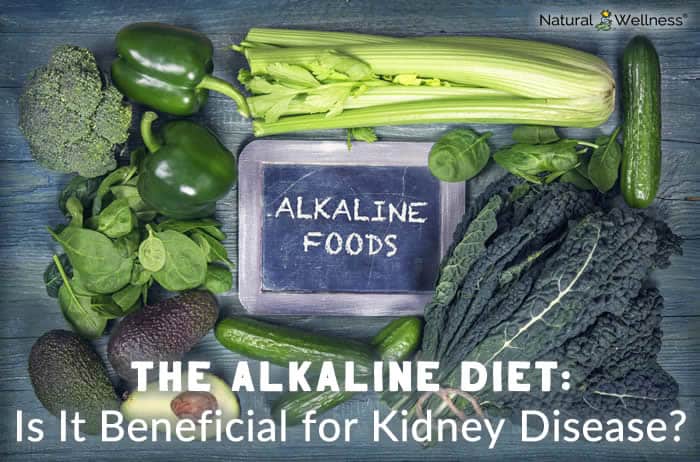

Our diet plays an important role in our life, and it can be even more important when you have a condition such as chronic kidney disease (CKD). Everything we eat and drink gets utilized by our body and can wind up either hurting or helping our health. The alkaline diet is one that has been researched and raises the question, “is this a diet that can benefit CKD?”
What is the Alkaline Diet?
The basis of the alkaline diet is that you can change the pH value of your body. The pH scale ranges from 0 to 14 (1):
- Acidic: 0.0 – 6.9
- Neutral: 7.0
- Alkaline (or basic): 7.1 – 14.0
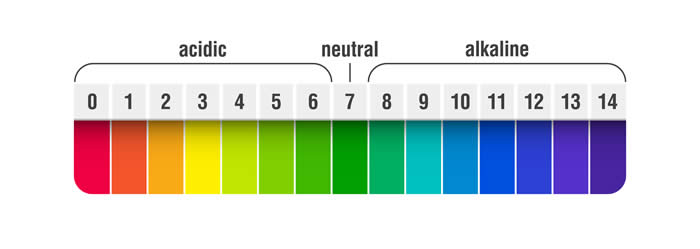 Our body is naturally slightly alkaline at a range from 7.35 to 7.45, which is necessary to survive. (2) There are various parts of our body that have a different pH, with our stomach being acidic at a pH range of 1.35 to 3.5.
Our body is naturally slightly alkaline at a range from 7.35 to 7.45, which is necessary to survive. (2) There are various parts of our body that have a different pH, with our stomach being acidic at a pH range of 1.35 to 3.5.
When we eat certain foods, after they are digested, they leave behind either an alkaline, neutral, or acidic waste. Supporters of the alkaline diet claim that this metabolic waste left behind can impact our body’s pH. The belief is that acidic byproduct increases your risk of illness and alkaline byproduct is protective.
Acidic foods tend to include:
- Meat
- Poultry
- Dairy
- Grains
- Alcohol
Where alkaline foods are:
- Fruits
- Nuts
- Legumes
- Vegetables
Some foods are also considered “neutral,” which includes unsalted butter, raw cow’s milk, and oils.
How Does the Alkaline Diet Impact Your Kidneys?
Your kidneys are the organ that maintains the acid-base balance of your body by removing hydrogen ions (acidic) through urine and reabsorbing bicarbonate (alkaline) in order to keep your body pH in the normal range. Diet is believed to be one the major players in the acid production that then needs to be filtered by the kidneys. (3)
Glomerular filtration rate (GFR) is a test that can be done to indicate how well your kidneys are filtering your blood. (4)
- Normal: GFR of 60 or higher
- Kidney disease: GFR below 60
- Kidney failure: GFR of 15 or below
With an already reduced filtration rate, eating high amounts of acidic foods forces your kidneys to adapt to continue to remove acid. This may promote bone loss, muscle loss, and a further decline in the GFR rate. (3)
What Research Says
Low-protein diets have been a standard recommendation for CKD patients for many years. The idea is that low-protein intake (0.6 grams protein per kilogram of ideal body weight) will slow CKD progression, and 60 to 70% of the protein needs to come from high biological value (HBV) sources. HBV sources includes animal proteins and limits bread and cereal.
The problem with this was that it resulted in low energy intake and individuals would have to also consume special low-protein foods and energy supplements, which they didn’t like and found hard to follow. Another concern was that studies didn’t always support this method of dieting for CKD, which made dietitians and doctors hesitant to recommend. (5)
2020 Study
The research on the alkaline diet and its impact on CKD is small but has promising results. One 2020 study published in the Global Journal of Medical and Clinical Case Reports (6) had a patient with a post-surgery acute renal injury follow an alkaline diet. This patient ate mostly white meat and fish as his protein 3 times per week, had 2 to 3 servings of fruit each day, and 1 to 2 servings of vegetables per day. They also replaced dairy with soy alternatives. This patient was monitored for 2.5 years and the results concluded that his GFR stayed steady with the alkaline diet and allowed him to be free of dialysis and maintain great nutritional status.
2018 Study
A 2018 study published in the Journal of Renal Nutrition (7) did the opposite to confirm if acidic foods do have a harmful impact on individuals with high risk of CKD progression. The results found that, out of the 3,257 participants, those that had higher dietary acid loads had increased odds of reduced kidney function along with greater risk of CKD.
Outline of Recommendations to Reduce Dietary Acid Load
A 2017 review article published by the National Kidney Foundation (5) provides a brief outline on dietary recommendations to keep acid load low.
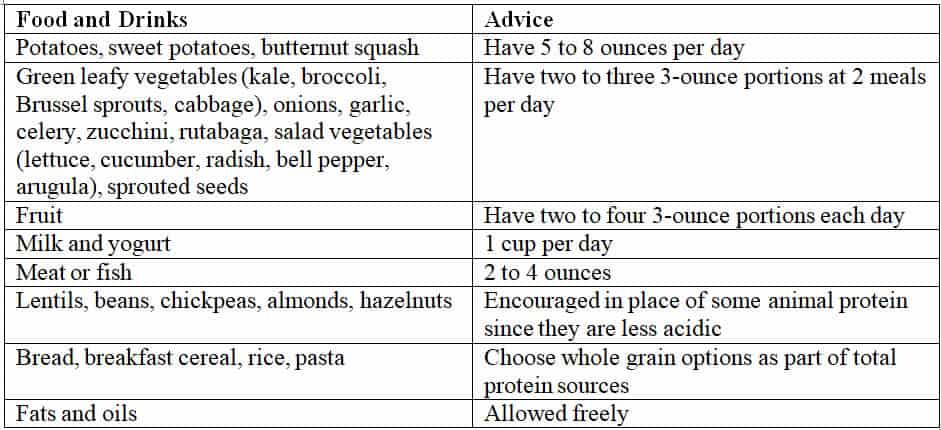
All of this advice is dependent on serum potassium levels, which are an important factor to consider with CKD.
The same article recommends avoiding:
- Spinach
- Chard
- Beetroot
- Peas
- Sweet corn
- Rhubarb
- Cheese
- Added salt
- Fizzy drinks including diet drinks and carbonated water
Be Cautious
Always talk to your doctor before making a drastic change in your diet to ensure that it will have a positive effect on your health. Some acidic forming foods still contain essential vitamins and minerals that you would miss out on. CKD may also require you to have higher needs of specific nutrients depending on treatment and appetite.
They include: (8)
- B complex
- Iron
- Vitamin C
- Vitamin D
- Calcium
Conclusion
The alkaline diet is something that may be considered by individuals dealing with CKD, after receiving approval from their doctor. Eating less acidic foods has the potential to take the filtration load off of the already low-functioning kidneys. More research with larger and longer studies needs to be completed to conclude the benefits of the alkaline diet for those with CKD.

